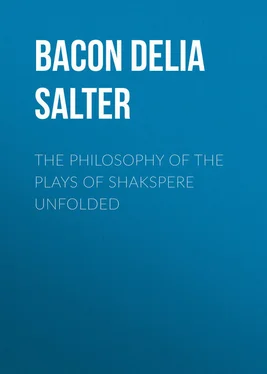Delia Bacon - The Philosophy of the Plays of Shakspere Unfolded
Здесь есть возможность читать онлайн «Delia Bacon - The Philosophy of the Plays of Shakspere Unfolded» — ознакомительный отрывок электронной книги совершенно бесплатно, а после прочтения отрывка купить полную версию. В некоторых случаях можно слушать аудио, скачать через торрент в формате fb2 и присутствует краткое содержание. Жанр: literature_19, foreign_antique, foreign_prose, на английском языке. Описание произведения, (предисловие) а так же отзывы посетителей доступны на портале библиотеки ЛибКат.
- Название:The Philosophy of the Plays of Shakspere Unfolded
- Автор:
- Жанр:
- Год:неизвестен
- ISBN:нет данных
- Рейтинг книги:3 / 5. Голосов: 1
-
Избранное:Добавить в избранное
- Отзывы:
-
Ваша оценка:
- 60
- 1
- 2
- 3
- 4
- 5
The Philosophy of the Plays of Shakspere Unfolded: краткое содержание, описание и аннотация
Предлагаем к чтению аннотацию, описание, краткое содержание или предисловие (зависит от того, что написал сам автор книги «The Philosophy of the Plays of Shakspere Unfolded»). Если вы не нашли необходимую информацию о книге — напишите в комментариях, мы постараемся отыскать её.
The Philosophy of the Plays of Shakspere Unfolded — читать онлайн ознакомительный отрывок
Ниже представлен текст книги, разбитый по страницам. Система сохранения места последней прочитанной страницы, позволяет с удобством читать онлайн бесплатно книгу «The Philosophy of the Plays of Shakspere Unfolded», без необходимости каждый раз заново искать на чём Вы остановились. Поставьте закладку, и сможете в любой момент перейти на страницу, на которой закончили чтение.
Интервал:
Закладка:
That some sparks of the old fire were not wanting, however, – that the nation which had kept alive in the common mind through so many generations, without the aid of books, the memory of that 'ancestor' that 'made its laws,' was not after all, perhaps, without a future – began to be evident about the time that the history of 'that last king of England who was the ancestor' of the English Stuart, was dedicated by the author of the Novum Organum to the Prince of Wales, afterwards Charles I., not without a glance at these portents.
Circumstances tending to throw doubt upon the durability of this institution – circumstances which seemed to portend that this monstrous innovation was destined on the whole to be a much shorter-lived one than the usurpation it had displaced – had not been wanting, indeed, from the first, in spite of those discouraging aspects of the question which were more immediately urged upon the contemporary observer.
It was in the eleventh century; it was in the middle of the Dark Ages, that the Norman and his followers effected their successful landing and lodgement here; it was in the later years of the fifteenth century, – it was when the bell that tolled through Europe for a century and a half the closing hour of the Middle Ages, had already begun its peals, that the Tudor 'came in by battle.'
That magnificent chain of events which begins in the middle of the fifteenth century to rear the dividing line between the Middle Ages and the Modern, had been slow in reaching England with its convulsions: it had originated on the continent. The great work of the restoration of the learning of antiquity had been accomplished there: Italy, Germany, and France had taken the lead in it by turns; Spain had contributed to it. The scientific discoveries which the genius of Modern Europe had already effected under that stimulus, without waiting for the New Organum, had all originated on the continent. The criticism on the institutions which the decaying Roman Empire had given to its Northern conquerors, – that criticism which necessarily accompanied the revival of learning began there. Not yet recovered from the disastrous wars of the fifteenth century, suffering from the diabolical tyranny that had overtaken her at that fatal crisis, England could make but a feeble response as yet to these movements. They had been going on for a century before the influence of them began to be visible here. But they were at work here, notwithstanding: they were germinating and taking root here, in that frozen winter of a nation's discontent; and when they did begin to show themselves on the historic surface, – here in this ancient soil of freedom, – in this natural retreat of it, from the extending, absorbing, consolidating feudal tyrannies, – here in this 'little world by itself' – this nursery of the genius of the North – with its chief races, with its union of races, its 'happy breed of men,' as our Poet has it, who notes all these points, and defines its position, regarding it, not with a narrow English partiality, but looking at it on his Map of the World, which he always carries with him, – looking at it from his 'Globe,' which has the Old World and the New on it, and the Past and the Future, – 'a precious stone set in the silver sea,' he calls it, 'in a great pool, a swan's nest ': – when that seed of all ages did at last show itself above the ground here, here in this nursery of hope for man, it would be with quite another kind of fruit on its boughs, from any that the continent had been able to mature from it.
It was in the later years of the sixteenth century, in the latter half of the reign of Elizabeth, that the Printing press, and the revived Learning of Antiquity, and the Reformation, and the discovery of America, the new revival of the genius of the North in art and literature, and the Scientific Discoveries which accompanied this movement on the continent, began to combine their effects here; and it was about that time that the political horizon began to exhibit to the statesman's eye, those portents which both the poet and the philosopher of that time, have described with so much iteration and amplitude. These new social elements did not appear to promise in their combination here, stability to the institutions which Henry the Seventh, and Henry the Eighth had established in this island.
The genius of Elizabeth conspired with the anomaly of her position to make her the steadfast patron and promoter of these movements, – worthy grand-daughter of Henry the seventh as she was, and opposed on principle, as she was, to the ultimatum to which they were visibly and stedfastly tending; but, at the same time, her sagacity and prudence enabled her to ward off the immediate result. She secured her throne, – she was able to maintain, in the rocking of those movements, her own political and spiritual supremacy, – she made gain and capital for absolutism out of them, – the inevitable reformation she herself assumed, and set bounds to: whatever new freedom there was, was still the freedom of her will; she could even secure the throne of her successor: it was mischief for Charles I. that she was nursing. The consequence of all this was — the Age of Elisabeth .
That was what this Queen meant it should be literally, and that was what it was apparently. But it so happened, that her will and humours on some great questions jumped with the time, and her dire necessities compelled her to lead the nation on its own track; or else it would have been too late, perhaps, for that exhibition of the monarchical institution, – that revival of the heroic, and ante -heroic ages, which her reign exhibits, to come off here as it did at that time.
It is this that makes the point in this literary history. This is the key that unlocks the secret of the Elizabethan Art of Delivery and Tradition. Without any material resources to sustain it – strong in the national sentiments, – strong in the moral forces with which the past controls the present, – strong in that natural abhorrence of change with which nature protects her larger growths, – that principle which tyranny can test so long with impunity – which it can test with impunity, till it forgets that this also has in nature its limits, – strong in the absence of any combination of opposition, to the young awakening England of that age, that now hollow image of the past, that phantom of the military force that had been, which seemed to be waiting only the first breath of the popular will to dissolve it, was as yet an armed and terrific reality; its iron was on every neck, its fetter was on every step, and all the new forces, and world-grasping aims and aspirations which that age was generating were held down and cramped, and tortured in its chains, dashing their eagle wings in vain against its iron limits.
As yet all England cowered and crouched, in blind servility, at the foot of that terrible, but unrecognised embodiment of its own power, armed out of its own armoury, with the weapons that were turned against it. So long as any yet extant national sentiment, or prejudice, was not yet directly assailed – so long as that arbitrary power was yet wise, or fortunate enough to withhold the blow which should make the individual sense of outrage, or the feeling of a class the common one – so long as those peaceful, social elements, yet waited the spark that was wanting to unite them – so long 'the laws of England' might be, indeed, at a Falstaff's or a Nym's or a Bardolph's 'commandment,' for the Poet has but put into 'honest Jack's' mouth, a boast that worse men than he, made good in his time – so long, the faith, the lives, the liberties, the dearest earthly hopes, of England's proudest subjects, her noblest, her bravest, her best, her most learned, her most accomplished, her most inspired, might be at the mercy of a woman's caprices, or the sport of a fool's sheer will and obstinacy, or conditioned on some low-lived 'favorites' whims. So long : And how long was that? – who does not know how long it was? – that was long enough for the whole Elizabethan Age to happen in. In the reign of Elizabeth, and in the reign of her successor, and longer still, that was the condition of it – till its last act was finished – till its last word was spoken and penned – till its last mute sign was made – till all its celestial inspiration had returned to the God who gave it – till all its Promethean clay was cold again.
Читать дальшеИнтервал:
Закладка:
Похожие книги на «The Philosophy of the Plays of Shakspere Unfolded»
Представляем Вашему вниманию похожие книги на «The Philosophy of the Plays of Shakspere Unfolded» списком для выбора. Мы отобрали схожую по названию и смыслу литературу в надежде предоставить читателям больше вариантов отыскать новые, интересные, ещё непрочитанные произведения.
Обсуждение, отзывы о книге «The Philosophy of the Plays of Shakspere Unfolded» и просто собственные мнения читателей. Оставьте ваши комментарии, напишите, что Вы думаете о произведении, его смысле или главных героях. Укажите что конкретно понравилось, а что нет, и почему Вы так считаете.












